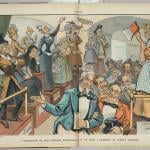Matthew doesn’t know where to put his “fulfillment formulae.” In chapter 2, he quotes Hosea when Jesus is leaving Israel; in chapter 21, he quotes Zechariah 9 before Jesus has climbed aboard the double-donkey mount. Jesus gives instructions to His disciples (vv. 2-3, then there’s a quotation from Zechariah (vv. 4-5), then the disciples do as Jesus tells them (v. 6-7a), and only then does Jesus mount up (v. 7b). You’d think the quotation would come after verse 7, but... Read more















